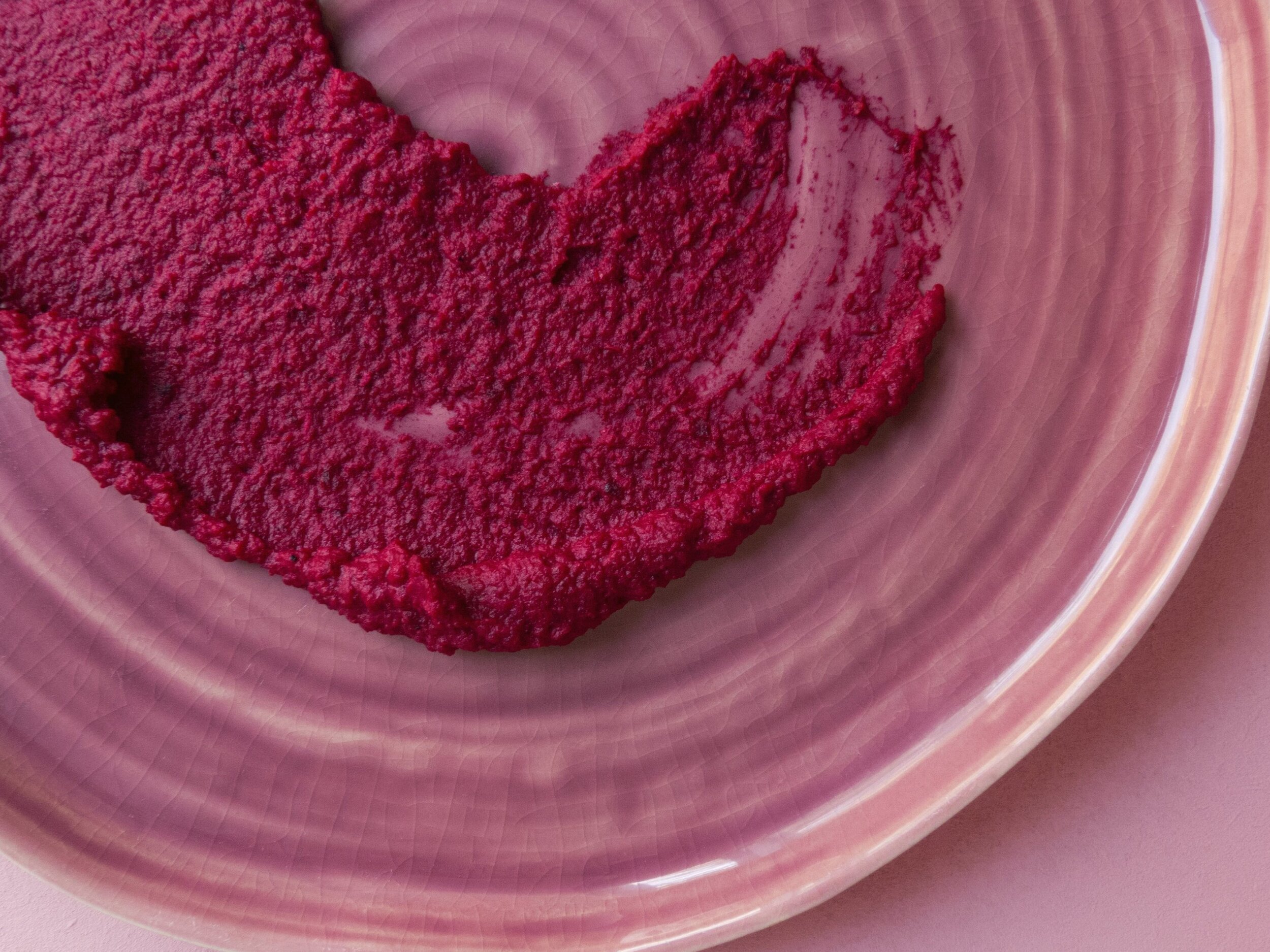First Food Recipe for your Baby - Baby Beet Hummus
This first food baby recipe is a huge favourite in our household. It is a great snack or lunch option for baby, toddler and kids, even the adults love it. Filled with wholesome ingredients and a hidden veggie, this fun pink dip will be a hit with your little ones. It is safe to give to your baby from 6 months of age, and is jam packed with protein and fibre. It is super easy to make and can be served with your baby’s favourite chopped veggies or pita bread.
Do I need to be concerned about allergies with baby hummus?
A question I get asked regularly is whether your baby can have an allergic reaction to hummus. In reality, your baby can have an allergic reaction to almost everything, however sesame (in hummus) is in the top 10 allergenic foods for babies. So it is higher risk than other foods. Read more about introducing allergenic foods to your baby here.
However the latest guidelines from ASCIA (Australian Society of Clinical Immunology & Allergy) suggest that the introduction of common allergenic foods should not be delayed in babies. Instead, foods should be introduced to infants before they turn 1 years old to help reduce the risk of them developing allergies. Furthermore, if your baby has no reaction to the allergenic foods, it’s best you continue exposing them throughout their childhood, to reduce the risk of allergies forming.
Let’s break down the ingredients in more detail.
Tahini
The ingredient in hummus that most concerns parents is tahini, which is made from sesame. Sesame allergy can be severe - similar to peanut allergy. Babies might get hives, or swelling in the face, to anaphylaxis.
Depending on your little one’s sensitivity, symptoms of sesame allergy can range from hives to an itchy mouth to a life-threatening anaphylaxis reaction soon after eating sesame seeds.
If you have a family allergy to sesame, or a strong family history of anaphylaxis, you might like to introduce this food in the presence of your family doctor. If you are not concerned with allergies, then it is safe to introduce tahini and sesame before 1 year of age.
Chickpeas
Cooked chickpeas (like many other legumes) have a tendency to cause uncomfortable gas (or wind) and are not quite as gentle on a baby’s developing digestive system as most simple fruits and veggies. However, many babies eat hummus and they are just fine!
If your baby is a bit on the gassy side, you might like to hold off on introducing chickpeas until they’re older and their digestive system has matured.
Allergies to legumes aren’t common, though many mothers report intolerances, with symptoms such as gas, sleep disruption, or explosive bowel motions. If this is the case, I’d suggest stopping exposure for 2 months, then trying again when the digestive system has matured.
If you are making your own hummus, always soak, rinse and drain the chickpeas several times before cooking to help reduce their gas producing potential.
Nutritional Benefits of Beetroot for your Baby
Rich in Vitamins and Minerals
Beets have an abundance of vitamins and minerals, including Vitamins A, B, C, K, and E, and potassium, magnesium, calcium, iron, etc. These are known to prevent and lower the risk of several diseases in kids including, diarrhoea, night blindness, beriberi, angular stomatitis, rickets, glossitis, osteomalacia, etc.
Lowers the Risk of Anaemia
Rich in iron content, beets will reduce your baby’s risk of anaemia. Iron promotes the production of red blood cells, provides oxygen to different parts of the body, and also aids in the development of your baby’s brain.
Assists Digestion
Beets are rich in fibre and can soothe the digestive system, improve digestion, and prevent constipation in babies.
Boosts Immunity
Beetroot is also known for enhancing the immune system due to the antioxidants present in them. This is particularly important for babies as their immune systems are still developing.
Cleanses the Body
Paired with cucumber and carrot juice, beetroot juice is known to cleanse the body, especially the gallbladder and the kidneys.
Please remember - beetroot is a high GI vegetable and must be combined with healthy fats and proteins (such as in this hummus) to regulate blood sugar levels.
Best Hummus Recipe for Baby
INGREDIENTS
2 medium beets, washed, peeled and diced
1 cup canned chickpeas, drained and rinsed
1⁄2 tsp. turmeric or sweet paprika
1 tbsp. tahini
1 tbsp. olive oil
2 tbsp. lemon juice
INSTRUCTIONS
Preheat the oven at 200C.
Prepare the beetroot, place in a baking dish and roast for 20 minutes or until soft. Leave to cool.
Place the beetroot and the rest of the ingredients in a food processor or blender and pulse until you have your desired consistency, scrapping down the sides and adding water as needed.
Notes:
This can be served as a smooth or chunky puree for your babe or as a healthy dip for toddlers!
Storage:
Store in an airtight container in the fridge for 3 – 4 days.






![As a nutritionist [and a Mum] the most common question I got asked by family & friends was "when do I start feeding my baby solid foods?"
Google, Facebook, community posts, Mums, Grandmas & Pinterest all say different things.
](https://images.squarespace-cdn.com/content/v1/5cb5b1e2049079446d948bf9/1621248789914-KE44IR8YNH2SENLYMG8S/image-asset.jpeg)
